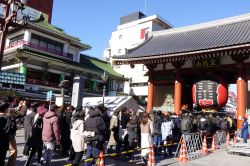
April 16, 2012
Breaking the Stonewall
A rebuilt organization is uniting Japan’s LGBT community
By Metropolis
Originally published on metropolis.co.jp on April 2012

While Japan doesn’t have a history of hostility towards homosexuality, neither is it open and accepting. That sexual orientation is not protected in most of Japan, combined with an immense pressure to conform to social norms, means many lesbian, gay, bisexual and transgender (LGBT) people remain closeted.
Outside major cities, the problem can be worse. In small towns, with little anonymity and a dearth of like-minded people, being gay can feel like a burden. “It’s very isolating,” says Lauren Anderson, vice president of LGBT support group Stonewall AJET.
Stonewall, which is connected with the JET program, takes its name from the 1969 riots that sparked the US gay rights movement. Though it has existed since 1998, it has struggled to solidify its direction and membership. In April last year, Anderson and her companions committed to making Stonewall a tool for the country’s gay community—Japanese and foreign alike.
“Mostly we’re trying to provide support,” explains president Alexandra Bindon. “Many of us are not out at work, some not even in their personal lives. Everyone’s situation is different.”
One activity is helping non-Japanese speakers navigate their local LGBT scene. Because of the secretive nature of Japan’s gay culture, it can be hard for newcomers to find info. Stonewall establishes a leader for each region, who collects and translates online resources for their area, and organizes social events.
ALTs make up the bulk of Stonewall’s membership, so the JET connection allows access to its target demographic. However, the relationship is not without problems. Though the Council of Local Authorities for International Relations (CLAIR)—the government overseer of JET—claims not to discriminate, sexual orientation is not specifically protected, which fuzzes rights and responsibilities. As cultural ambassadors, should JETs bow to local culture, or prioritize awareness-raising where appropriate? CLAIR has told Stonewall that they might “consider an addition” regarding sexual orientation in their general handbook.
Other gray areas include participation in gay rights events, where teachers wonder if activities will affect contract renewal. JET prohibits participation in political events “related to his/her work duties.” “Is marching in a pride parade considered political or not?” poses Bindon. “Is that a breach of contract?”
The group is also reaching out to the Japanese LGBT community in a big way. They have volunteered to assist with English outreach for this year’s Tokyo Rainbow Pride parade on April 29.
“We want to work with Stonewall not just because they can speak English,” says parade organizer Hiroteru Inui, “but because their skills and knowledge are valuable for us.”
“We’re figuring out how to be a positive influence in our community and carry the movement forward,” says Bindon. Stonewall members don’t claim to have all the answers, but hope to work with local counterparts to bring the LGBT community into mainstream Japanese society.
http://stonewall.ajet.net. Tokyo Rainbow Pride @Yoyogi Park, Apr 29. See other events listings for details.







